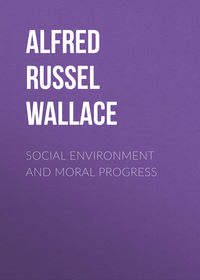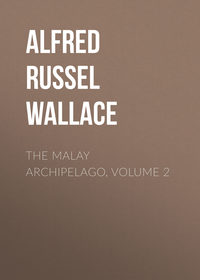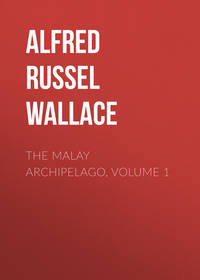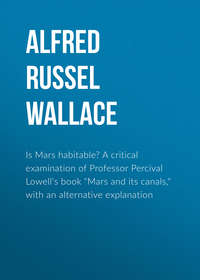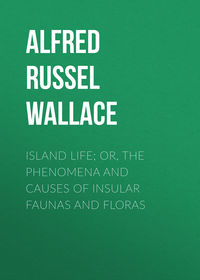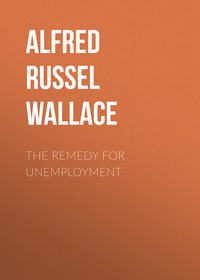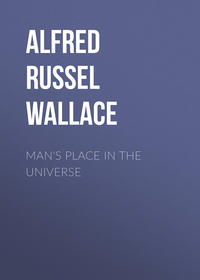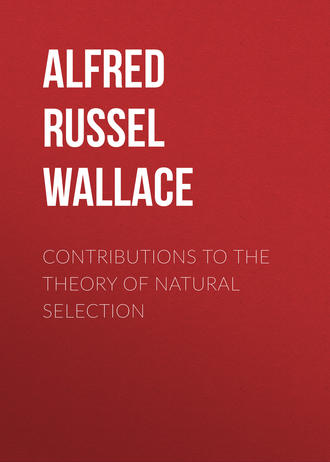 полная версия
полная версияContributions to the Theory of Natural Selection
In his latest work (“An Introduction to the Classification of Animals,”) published in 1869, Professor Huxley unhesitatingly adopts the “well founded doctrine, that life is the cause and not the consequence of organization.” In his celebrated article “On the Physical Basis of Life,” however, he maintains, that life is a property of protoplasm, and that protoplasm owes its properties to the nature and disposition of its molecules. Hence he terms it “the matter of life,” and believes that all the physical properties of organized beings are due to the physical properties of protoplasm. So far we might, perhaps, follow him, but he does not stop here. He proceeds to bridge over that chasm which Professor Tyndall has declared to be “intellectually impassable,” and, by means which he states to be logical, arrives at the conclusion, that our “thoughts are the expression of molecular changes in that matter of life which is the source of our other vital phenomena.” Not having been able to find any clue in Professor Huxley’s writings, to the steps by which he passes from those vital phenomena, which consist only, in their last analysis, of movements of particles of matter, to those other phenomena which we term thought, sensation, or consciousness; but, knowing that so positive an expression of opinion from him will have great weight with many persons, I shall endeavour to show, with as much brevity as is compatible with clearness, that this theory is not only incapable of proof, but is also, as it appears to me, inconsistent with accurate conceptions of molecular physics. To do this, and in order further to develop my views, I shall have to give a brief sketch of the most recent speculations and discoveries, as to the ultimate nature and constitution of matter.
The Nature of Matter
It has been long seen by the best thinkers on the subject, that atoms,—considered as minute solid bodies from which emanate the attractive and repulsive forces which give what we term matter its properties,—could serve no purpose whatever; since it is universally admitted that the supposed atoms never touch each other, and it cannot be conceived that these homogeneous, indivisible, solid units, are themselves the ultimate cause of the forces that emanate from their centres. As, therefore, none of the properties of matter can be due to the atoms themselves, but only to the forces which emanate from the points in space indicated by the atomic centres, it is logical continually to diminish their size till they vanish, leaving only localized centres of force to represent them. Of the various attempts that have been made to show how the properties of matter may be due to such modified atoms (considered as mere centres of force), the most successful, because the simplest and the most logical, is that of Mr. Bayma, who, in his “Molecular Mechanics,” has demonstrated how, from the simple assumption of such centres having attractive and repulsive forces (both varying according to the same law of the inverse squares as gravitation), and by grouping them in symmetrical figures, consisting of a repulsive centre, an attractive nucleus, and one or more repulsive envelopes, we may explain all the general properties of matter; and, by more and more complex arrangements, even the special chemical, electrical, and magnetic properties of special forms of matter.9 Each chemical element will thus consist of a molecule formed of simple atoms, (or as Mr. Bayma terms them to avoid confusion, “material elements”) in greater or less number and of more or less complex arrangement; which molecule is in stable equilibrium, but liable to be changed in form by the attractive or repulsive influences of differently constituted molecules, constituting the phenomena of chemical combination, and resulting in new forms of molecule of greater complexity and more or less stability.
Those organic compounds of which organized beings are built up, consist, as is well known, of matter of an extreme complexity. and great instability; whence result the changes of form to which it is continually subject. This view enables us to comprehend the possibility, of the phenomena of vegetative life being due to an almost infinite complexity of molecular combinations, subject to definite changes under the stimuli of heat, moisture, light, electricity, and probably some unknown forces. But this greater and greater complexity, even if carried to an infinite extent, cannot, of itself, have the slightest tendency to originate consciousness in such molecules or groups of molecules. If a material element, or a combination of a thousand material elements in a molecule, are alike unconscious, it is impossible for us to believe, that the mere addition of one, two, or a thousand other material elements to form a more complex molecule, could in any way tend to produce a self-conscious existence. The things are radically distinct. To say that mind is a product or function of protoplasm, or of its molecular changes, is to use words to which we can attach no clear conception. You cannot have, in the whole, what does not exist in any of the parts; and those who argue thus should put forth a definite conception of matter, with clearly enunciated properties, and show, that the necessary result of a certain complex arrangement of the elements or atoms of that matter, will be the production of self-consciousness. There is no escape from this dilemma,—either all matter is conscious, or consciousness is something distinct from matter, and in the latter case, its presence in material forms is a proof of the existence of conscious beings, outside of, and independent of, what we term matter. (Note B.)
Matter is Force.—The foregoing considerations lead us to the very important conclusion, that matter is essentially force, and nothing but force; that matter, as popularly understood, does not exist, and is, in fact, philosophically inconceivable. When we touch matter, we only really experience sensations of resistance, implying repulsive force; and no other sense can give us such apparently solid proofs of the reality of matter, as touch does. This conclusion, if kept constantly present in the mind, will be found to have a most important bearing on almost every high scientific and philosophical problem, and especially on such as relate to our own conscious existence.
All Force is probably Will-Force.—If we are satisfied that force or forces are all that exist in the material universe, we are next led to enquire what is force? We are acquainted with two radically distinct or apparently distinct kinds of force—the first consists of the primary forces of nature, such as gravitation, cohesion, repulsion, heat, electricity, &c.; the second is our own will-force. Many persons will at once deny that the latter exists. It will be said, that it is a mere transformation of the primary forces before alluded to; that the correlation of forces includes those of animal life, and that will itself is but the result of molecular change in the brain. I think, however, that it can be shown, that this latter assertion has neither been proved, nor even been proved to be possible; and that in making it, a great leap in the dark has been taken from the known to the unknown. It may be at once admitted that the muscular force of animals and men, is merely the transformed energy derived from the primary forces of nature. So much has been, if not rigidly proved, yet rendered highly probable, and it is in perfect accordance with all our knowledge of natural forces and natural laws. But it cannot be contended that the physiological balance-sheet has ever been so accurately struck, that we are entitled to say, not one-thousandth part of a grain more of force has been exerted by any organized body or in any part of it, than has been derived from the known primary forces of the material world. If that were so, it would absolutely negative the existence of will; for if will is anything, it is a power that directs the action of the forces stored up in the body, and it is not conceivable that this direction can take place, without the exercise of some force in some part of the organism. However delicately a machine may be constructed, with the most exquisitely contrived detents to release a weight or spring by the exertion of the smallest possible amount of force, some external force will always, be required; so, in the animal machine, however minute may be the changes required in the cells or fibres of the brain, to set in motion the nerve currents which loosen or excite the pent up forces of certain muscles, some force must be required to effect those changes. If it is said, “those changes are automatic, and are set in motion by external causes,” then one essential part of our consciousness, a certain amount of freedom in willing, is annihilated; and it is inconceivable how or why there should have arisen any consciousness or any apparent will, in such purely automatic organisms. If this were so, our apparent will would be a delusion, and Professor Huxley’s belief—“that our volition counts for something as a condition of the course of events,” would be fallacious, since our volition would then be but one link in the chain of events, counting for neither more nor less than any other link whatever.
If, therefore, we have traced one force, however minute, to an origin in our own will, while we have no knowledge of any other primary cause of force, it does not seem an improbable conclusion that all force may be will-force; and thus, that the whole universe, is not merely dependent on, but actually is, the will of higher intelligences or of one Supreme Intelligence. It has been often said that the true poet is a seer; and in the noble verse of an American poetess, we find expressed, what may prove to be the highest fact of science, the noblest truth of philosophy:
God of the Granite and the Rose!Soul of the Sparrow and the Bee!The mighty tide of Being flowsThrough countless channels, Lord, from thee.It leaps to life in grass and flowers,Through every grade of being runs,While from Creation’s radiant towersIts glory flames in Stars and Suns.Conclusion
These speculations are usually held to be far beyond the bounds of science; but they appear to me to be more legitimate deductions from the facts of science, than those which consist in reducing the whole universe, not merely to matter, but to matter conceived and defined so as to be philosophically inconceivable. It is surely a great step in advance, to get rid of the notion that matter is a thing of itself, which can exist per se, and must have been eternal, since it is supposed to be indestructible and uncreated,—that force, or the forces of nature, are another thing, given or added to matter, or else its necessary properties,—and that mind is yet another thing, either a product of this matter and its supposed inherent forces, or distinct from and co-existent with it;—and to be able to substitute for this complicated theory, which leads to endless dilemmas and contradictions, the far simpler and more consistent belief, that matter, as an entity distinct from force, does not exist; and that force is a product of mind. Philosophy had long demonstrated our incapacity to prove the existence of matter, as usually conceived; while it admitted the demonstration to each of us of our own self-conscious, ideal existence. Science has now worked its way up to the same result, and this agreement between them should give us some confidence in their combined teaching.
The view we have now arrived at seems to me more grand and sublime, as well as far simpler, than any other. It exhibits the universe, as a universe of intelligence and will-power; and by enabling us to rid ourselves of the impossibility of thinking of mind, but as connected with our old notions of matter, opens up infinite possibilities of existence, connected with infinitely varied manifestations of force, totally distinct from, yet as real as, what we term matter.
The grand law of continuity which we see pervading our universe, would lead us to infer infinite gradations of existence, and to people all space with intelligence and will-power; and, if so, we have no difficulty in believing that for so noble a purpose as the progressive development of higher and higher intelligences, those primal and general will-forces, which have sufficed for the production of the lower animals, should have been guided into new channels and made to converge in definite directions. And if, as seems to me probable, this has been done, I cannot admit that it in any degree affects the truth or generality of Mr. Darwin’s great discovery. It merely shows, that the laws of organic development have been occasionally used for a special end, just as man uses them for his special ends; and, I do not see that the law of “natural selection” can be said to be disproved, if it can be shown that man does not owe his entire physical and mental development to its unaided action, any more than it is disproved by the existence of the poodle or the pouter pigeon, the production of which may have been equally beyond its undirected power.
The objections which in this essay I have taken, to the view,—that the same law which appears to have sufficed for the development of animals, has been alone the cause of man’s superior physical and mental nature,—will, I have no doubt, be over-ruled and explained away. But I venture to think they will nevertheless maintain their ground, and that they can only be met by the discovery of new facts or new laws, of a nature very different from any yet known to us. I can only hope that my treatment of the subject, though necessarily very meagre, has been clear and intelligible; and that it may prove suggestive, both to the opponents and to the upholders of the theory of Natural Selection.
NOTES
NOTE A. (Page 360.)
Some of my critics seem quite to have misunderstood my meaning in this part of the argument. They have accused me of unnecessarily and unphilosophically appealing to “first causes” in order to get over a difficulty—of believing that “our brains are made by God and our lungs by natural selection;” and that, in point of fact, “man is God’s domestic animal.” An eminent French critic, M. Claparède, makes me continually call in the aid of—“une Force supérieure,” the capital F, meaning I imagine that this “higher Force” is the Deity. I can only explain this misconception by the incapacity of the modern cultivated mind to realise the existence of any higher intelligence between itself and Deity. Angels and archangels, spirits and demons, have been so long banished from our belief as to have become actually unthinkable as actual existences, and nothing in modern philosophy takes their place. Yet the grand law of “continuity,” the last outcome of modern science, which seems absolute throughout the realms of matter, force, and mind, so far as we can explore them, cannot surely fail to be true beyond the narrow sphere of our vision, and leave an infinite chasm between man and the Great Mind of the universe. Such a supposition seems to me in the highest degree improbable.
Now, in referring to the origin of man, and its possible determining causes, I have used the words “some other power”—“some intelligent power”—“a superior intelligence”—“a controlling intelligence,” and only in reference to the origin of universal forces and laws have I spoken of the will or power of “one Supreme Intelligence.” These are the only expressions I have used in alluding to the power which I believe has acted in the case of man, and they were purposely chosen to show, that I reject the hypothesis of “first causes” for any and every special effect in the universe, except in the same sense that the action of man or of any other intelligent being is a first cause. In using such terms I wished to show plainly, that I contemplated the possibility that the development of the essentially human portions of man’s structure and intellect may have been determined by the directing influence of some higher intelligent beings, acting through natural and universal laws. A belief of this nature may or may not have a foundation, but it is an intelligible theory, and is not, in its nature, incapable of proof; and it rests on facts and arguments of an exactly similar kind to those, which would enable a sufficiently powerful intellect to deduce, from the existence on the earth of cultivated plants and domestic animals, the presence of some intelligent being of a higher nature than themselves.
NOTE B. (Page 365.)
A friend has suggested that I have not here explained myself sufficiently, and objects, that life does not exist in matter any more than consciousness, and if the one can be produced by the laws of matter, why may not the other? I reply, that there is a radical difference between the two. Organic or vegetative life consists essentially in chemical transformations and molecular motions, occurring under certain conditions and in a certain order. The matter, and the forces which act upon it, are for the most part known; and if there are any forces engaged in the manifestation of vegetative life yet undiscovered (which is a moot question), we can conceive them as analogous to such forces as heat, electricity, or chemical affinity, with which we are already acquainted. We can thus clearly conceive of the transition from dead matter to living matter. A complex mass which suffers decomposition or decay is dead, but if this mass has the power of attracting to itself, from the surrounding medium, matter like that of which it is composed, we have the first rudiment of vegetative life. If the mass can do this for a considerable time, and if its absorption of new matter more than replaces that lost by decomposition, and if it is of such a nature as to resist the mechanical or chemical forces to which it is usually exposed, and to retain a tolerably constant form, we term it a living organism. We can conceive an organism to be so constituted, and we can further conceive that any fragments, which may be accidentally broken from it, or which may fall away when its bulk has become too great for the cohesion of all its parts, may begin to increase anew and run the same course as the parent mass. This is growth and reproduction in their simplest forms; and from such a simple beginning it is possible to conceive a series of slight modifications of composition, and of internal and external forces, which should ultimately lead to the development of more complex organisms. The life of such an organism may, perhaps, be nothing added to it, but merely the name we give to the result of a balance of internal and external forces in maintaining the permanence of the form and structure of the individual. The simplest conceivable form of such life would be the dewdrop, which owes its existence to the balance between the condensation of aqueous vapour in the atmosphere and the evaporation of its substance. If either is in excess, it soon ceases to maintain an individual existence. I do not maintain that vegetative life is wholly due to such a complex balance of forces, but only that it is conceivable as such.
With consciousness the case is very different. Its phenomena are not comparable with those of any kind of matter subjected to any of the known or conceivable forces of nature; and we cannot conceive a gradual transition from absolute unconsciousness to consciousness, from an unsentient organism to a sentient being. The merest rudiment of sensation or self-consciousness is infinitely removed from absolutely non-sentient or unconscious matter. We can conceive of no physical addition to, or modification of, an unconscious mass which should create consciousness; no step in the series of changes organised matter may undergo, which should bring in sensation where there was no sensation or power of sensation at the preceding step. It is because the things are utterly incomparable and incommensurable that we can only conceive of sensation coming to matter from without, while life may be conceived as merely a specific combination and co-ordination of the matter and the forces that compose the universe, and with which we are separately acquainted. We may admit with Professor Huxley that protoplasm is the “matter of life” and the cause of organisation, but we cannot admit or conceive that protoplasm is the primary source of sensation and consciousness, or that it can ever of itself become conscious in the same way as we may perhaps conceive that it may become alive.
INDEX
ABRAXAS grossulariata, 119.
Acanthotritus dorsalis, 94.
Accipiter pileatus, 107.
Acræidæ, the subjects of mimicry, 85, 86.
Acronycta psi, protective colouring of, 62.
Adaptation brought about by general laws, 276;
looks like design, 281.
Ægeriidæ mimic Hymenoptera, 90.
Agassiz, or embryonic character of ancient animals, 301.
Agnia fasciata, mimics another Longicorn, 95.
Agriopis aprilina, protective colouring of, 62.
Alcedinidæ, sexual colouring and nidification of, 240.
Amadina, sexual colouring and nidification of, 243.
Ampelidæ, sexual colouring and nidification of, 243.
Ancylotherium, 300.
Andrenidæ, 98.
Angræcum sesquipedale, 272;
its fertilization by a large moth, 275.
Animals, senses and faculties of, 127;
intellect of, compared with that of savages, 341.
Anisocerinæ, 92.
Anoa, 196.
Anoplotherium, 299.
Anthribidæ, mimicry of, 94;
dimorphism in, 155.
Anthrocera filipendulæ, 120.
Anthropologists, wide difference of opinion among, as to origin of human races, 304;
conflicting views of, harmonized, 321.
Antiquity of man, 303, 322.
Apathus, 98.
Apparent exceptions to law of colour and nidification, 253.
Aquatic birds, why abundant, 32.
Araschnia prorsa, 154.
Archegosaurus, 300.
Archæopteryx, 300.
Architecture of most nations derivative, 228;
Grecian, false in principle, 226.
Arctic animals, white colour of, 50, 51.
Argyll, Duke of, on colours of Woodcock, 53;
on mind in nature, 265;
criticism on Darwin’s works, 269;
on humming birds 282;
on creation by birth, 282.
Asilus, 97.
Aspects of nature as influencing man’s development, 317.
BABIRUSA, 196.
Balance in nature, 42.
Barrington, Hon. Daines, on song of birds, 220.
Basilornis, 196.
Bates, Mr., first adopted the word “mimicry,” 75;
his observations on Leptalis and Heliconidæ, 82;
his paper explaining the theory of mimicry, 83;
objections to his theory, 108;
on variation, 165;
on recent immigration of Amazonian Indians, 214.
Bayma, Mr., on “Molecular Mechanics,” 363, 364.
Beauty in nature, 282;
not universal, 284;
of flowers useful to them, 285;
not given for its own sake, 285.
Birds, possible rapid increase of, 29;
numbers that die annually, 30;
mimicry among, 103;
dull colour of females, 114;
nidification as affecting colour of females, 116;
refusing the gooseberry caterpillar, 119;
the highest in rank and organization, 137;
dimorphism in, 155;
why peculiar nest built by each species, 215-219;
build more perfect nests as they grow older, 224, 227;
alter and improve their nests, 226;
sexual differences of colour in, 239.
Bombus hortorum, 90.
Bombycilla, garrula, colours and nidification of, 255.
Bombylius, 98.
Brain of the savage but slightly less than that of civilized man, 336;
size of, an important element of mental power, 335;
of savage races larger than their needs require, 338, 343;
of man and of anthropoid apes compared, 338.
Broca, Professor Paul, on the fine crania of the cave men, 337.
Bryophila glandifera and B. perla protectively coloured, 63.
Bucerotidæ, sexual colouring and nidification of, 241.
Bucconidæ, sexual colouring and nidification of, 241.
Buff-tip moth, resembles a broken stick, 62.


